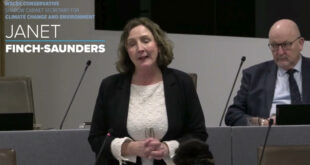Over 115,000 Royal Mail workers across the UK could strike over pay in the coming months, the Communication Workers Union (CWU) announced this week. Cardiff, where 18 delivery offices are based, will see around 1,600 workers joining the dispute and 7,000 across Wales.
Amarjite Singh, branch secretary for the CWU in South East Wales, spoke to voice.wales about how the ballot was, workers’ demands and what could happen next.
By Ka Long Tung. Cover Image: Amarjite Singh stands next to the South East Wales CWU banner, copyright Ka Long Tung
The CWU announced on Tuesday that 97.6% of its members on a 77% turnout had voted in favour of industrial action over pay. However, no strike dates have yet been decided.
The Union is demanding the Royal Mail enter negotiations to secure a “straight, no-strings pay increase for workers.”
In April, the CWU were in talks with Royal Mail about a pay rise for its members but the company insisted and later imposed a non-conditional 2% pay rise on its employees. The offer is well below the rate of inflation, currently between 9% and 11%rise, meaning workers would face a pay cut in real terms.
Since then , the CWU began communicating with Royal Mail workers on the importance of a strike in their fight for better pay. Amarjite Singh, who is based in Cardiff but represents members across the south east, said that the ballot benefited from the union having a chance to talk to its members face-to-face during open air gate meetings.
“We have a representative in nearly every delivery office, every shift in the mail centre and the same in the vehicle operation unit,” said Singh. “We had an opportunity to make sure that we went into every workplace, stand by that rep, and speak to our members, and explain to them what the ballot was actually about.”
“So we’re unique that we can get them all together, and we can speak to them face to face, and get the issues and raise the issues with them.”
After anti-union laws came into force in 2017, unions must now achieve a turnout of at least 50% of its membership for strike ballots to be legal, making it harder for industrial action to get off the ground.
Singh explained how, after the union’s conference in April, work began in encouraging members to vote and support strike action.
“So I would say, middle of May we started mobilising our members that we were going out to start to speak to them. So we’ve had lots of discussions with our members.”
This approach resulted in a massive turnout and support for the walkout.
“A 2% is a pay cut. It’s not a pay rise,” said Singh. “We’re demanding a pay rise that’s in line with inflation.”
“It [inflation] is driving our members to use food banks. They go into loan sharks to borrow money while Royal Mail chief executives themselves have creamed some of the profits.”

Although Royal Mail insisted on only a 2% pay rise for its workers, Simon Thompson, the company’s chief executive, was handed a bonus of £140,000 in June.
“The arguments are simple – Royal Mail Group announced £758m profit, handed £400m to shareholders and pay two CEOs over £2m – and our members aren’t having it,” said the CWU general secretary, Dave Ward.
Royal Mail had accused the CWU of “not engaged in any meaningful discussion on the changes we need to make to adapt.” However, Singh said it’s the other way around. “Royal Mail hasn’t engaged with us because they’re saying it’s only 2% on the table,” said Singh.
Following the strike vote, Royal Mail said they would continue to seek an agreement, whilst Dave Ward, CWU general secretary, said there is now a ‘small window’ for talks to avoid walkouts before strike dates are set.
In addition to the non-conditional 2% pay rise, Royal Mail has also announced a further 3.5% pay rise, subject to further talks and agreements. But Singh said the company manipulated the figures and the extra 3.5% would result in worsening working conditions.
“If you look at those changes, they will decimate the terms and conditions of our members,” said Singh. “So to sell our souls for 3.5% is not going to happen.”
Meanwhile, The CWU has now served notice for a second ballot claiming that Royal Mail had moved “on a raft of aggressive and ill thought out changes.” The union said they would now aim to meet its 115,000 members across 1,500 workplaces in one week.
Singh said that any industrial action will likely happen after August 17, but that the duration of the walkout is yet to be clarified.
The CWU branch secretary was optimistic about the union’s demand. On Wednesday, Royal Mail said it’s losing £1 million a day as it struggled to cut costs. “Can they afford us to go on strike? They will be losing more than £1 million a day. They will lose,” said Singh.
He said the company is losing faith in Simon Thompson as the company’s stock price had declined over the last year. “I think the confidence in Simon Thompson would be questioned. They have to demonstrate to shareholders that they are engaging back well.”
“Would the government let this happen? I don’t know,” said Singh. “Remember in the pandemic, they were clapping us for delivering the test kits and everything else.”
The Royal Mail walkout is amongst the wave of disputes in the so-called summer of discontent. Workers in different industries have taken or will take industrial action to demand pay rise to keep up with the soaring living cost. The next phase of the largest rail strike in decades will take place next Wednesday, 27th July when RMT members strike.
CWU members across BT Group will also strike on July 29th and August 1st.


